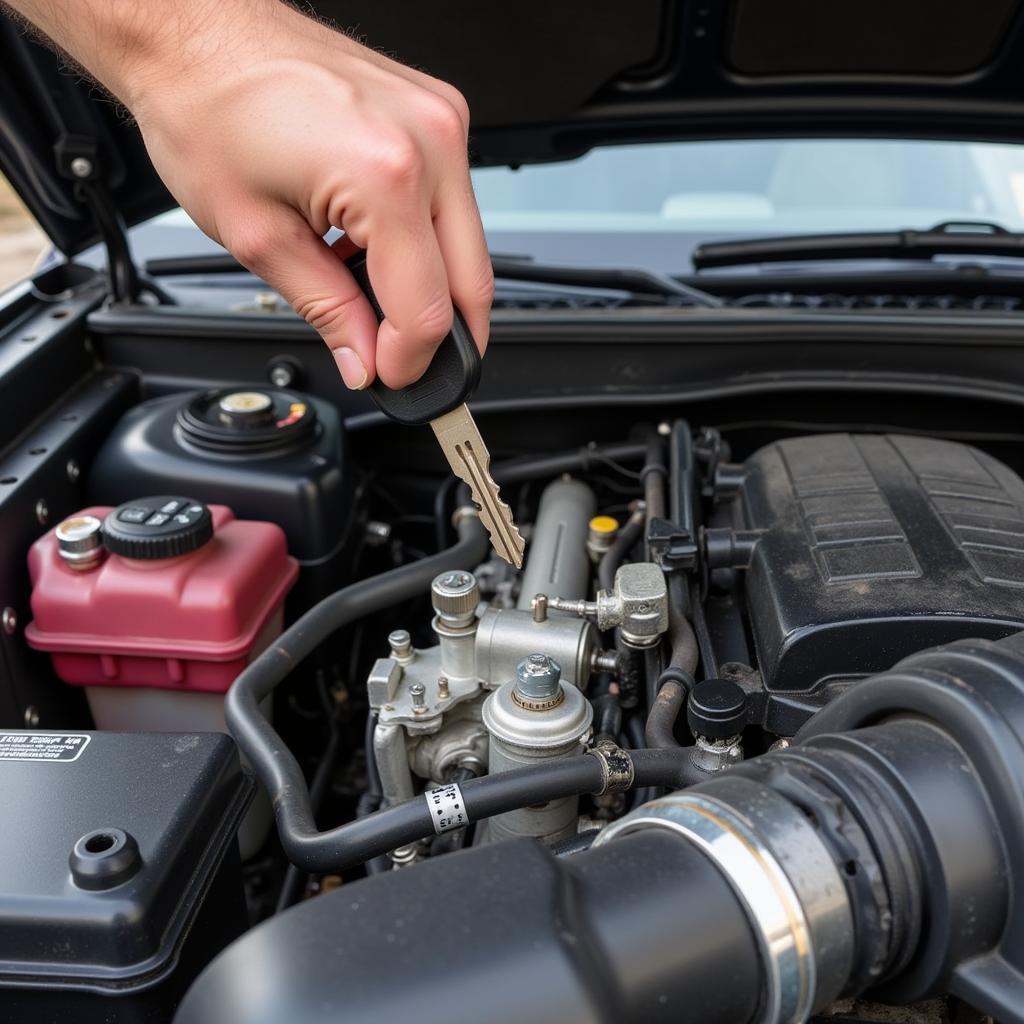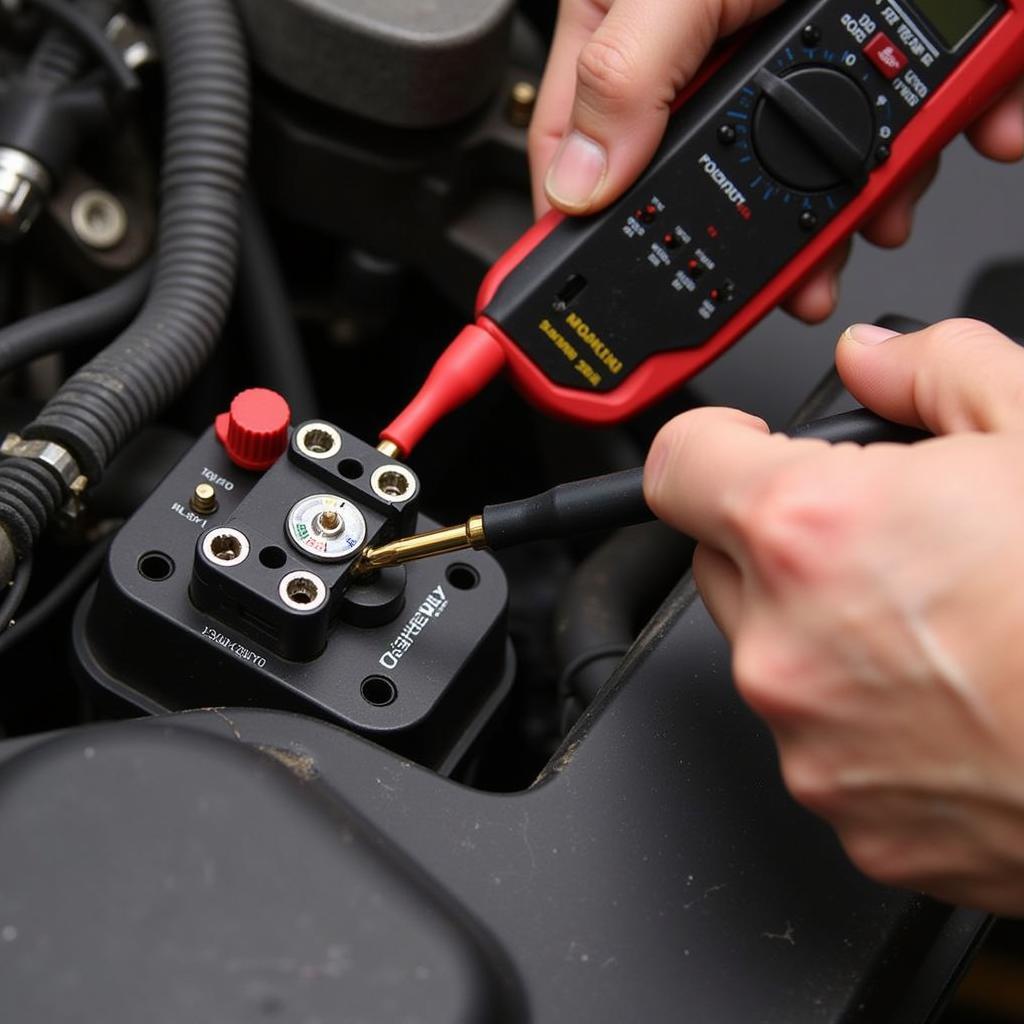A car not starting is frustrating, especially when the culprit seems to be the starter. This guide delves into the “Car Not Starting Problem With Starter,” offering troubleshooting tips, diagnostic advice, and potential solutions for car owners, mechanics, and technicians.
If you find your car struggling to start in the morning, check out our guide on problem starting car in the morning.
Understanding the Starter and Its Role
The starter motor is a crucial component in your vehicle’s starting system. It’s responsible for cranking the engine, initiating the combustion process that brings your car to life. When you turn the ignition key or press the start button, the starter engages with the engine’s flywheel, spinning it and setting the pistons in motion. A malfunctioning starter can lead to a variety of starting problems, from a complete failure to start to intermittent issues.
Common Symptoms of a Faulty Starter
Several symptoms can indicate a problem with your car’s starter motor. Recognizing these signs early can save you time, money, and frustration. These include:
- Clicking sound when turning the key: This is a classic sign of a failing starter solenoid, a component within the starter that engages the motor.
- Grinding noise during starting: This often suggests damaged starter gears or a misaligned starter.
- The engine doesn’t crank: If you hear nothing when you turn the key, the starter motor may be completely dead.
- Intermittent starting problems: Sometimes the car starts fine, and other times it doesn’t. This can be particularly tricky to diagnose and can point to a failing starter, wiring issues, or other related problems.
- Smoke coming from the starter: This indicates a serious electrical problem within the starter and requires immediate attention.
 Car Starter Clicking Noise
Car Starter Clicking Noise
Diagnosing a Car Not Starting Problem with Starter
Before replacing the starter, it’s crucial to diagnose the problem accurately. A multimeter can be a valuable tool in this process.
- Test the battery: Ensure the battery has sufficient voltage. A weak battery can mimic starter problems.
- Check the starter solenoid: Use a multimeter to test the voltage at the solenoid when the key is turned.
- Inspect the starter wiring: Look for loose connections, corrosion, or damaged wires.
- Test the starter motor directly: This involves bypassing the ignition system and applying power directly to the starter. This test requires caution and should be performed by a qualified mechanic.
You can find helpful information about other starting problems on our page about starting problems in car.
Troubleshooting and Solutions
Once you’ve diagnosed the problem, you can explore various solutions. These range from simple fixes to more complex repairs:
- Clean battery terminals and connections: Corrosion can impede current flow. Cleaning the terminals and cable connections can sometimes resolve the issue.
- Tap the starter: Sometimes a gentle tap on the starter can temporarily dislodge a stuck component and allow the motor to engage. This is a temporary fix and shouldn’t be relied upon long-term.
- Replace the starter solenoid: If the solenoid is faulty, replacing it is a more cost-effective solution than replacing the entire starter motor.
- Replace the starter motor: If the starter motor is beyond repair, replacement is the only option.
 Testing Car Starter with Multimeter
Testing Car Starter with Multimeter
For specific starter issues with the Mazda 3, you can refer to our guide on mazda 3 car starter problems.
Preventing Future Starter Problems
Regular maintenance can help prevent starter problems. These include:
- Regular battery checks: Ensure your battery is in good condition and maintains proper voltage.
- Inspecting starter wiring: Look for any signs of damage or corrosion.
- Avoiding excessive cranking: If the engine doesn’t start within a few seconds, stop cranking and investigate the cause.
If you need professional help, find a qualified mechanic using our guide on car mechanic near me for starting car problems.
“A well-maintained battery and regular checks of the starter system can significantly reduce the likelihood of encountering car not starting problem with starter,” says John Smith, ASE Certified Master Technician.
“Don’t underestimate the importance of clean battery terminals. A surprising number of starting problems are simply due to corroded connections,” adds Jane Doe, Automotive Electrical Specialist.
Conclusion
Addressing a car not starting problem with starter involves systematic diagnosis and troubleshooting. By understanding the symptoms, performing the necessary checks, and implementing the appropriate solutions, you can get your car back on the road. If the problem persists, consulting a qualified mechanic is always recommended. For persistent solenoid issues, consider exploring resources on solenoid problems car.
Contact AutoTipPro at +1 (641) 206-8880 or visit our office at 500 N St Mary’s St, San Antonio, TX 78205, United States for further assistance.





Leave a Reply